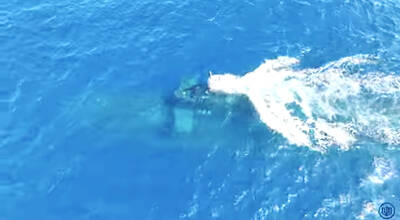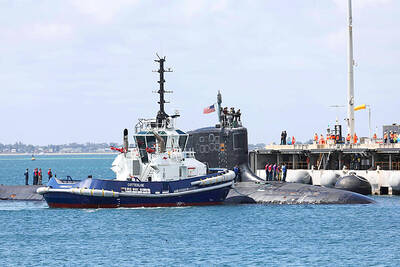Taiwan will offer a Mandarin version of the Test of English as a Foreign Language (TOEFL) exam by next summer, according to the Ministry of Education. Foreign students and overseas Taiwanese-Chinese applying to study in universities will be required to take the new test, and will have to take Mandarin lessons to supplement their studies if they don't pass it.
The Chinese Proficiency Test, developed by National Taiwan Normal University, has had a number of trial runs over the last few days, but it will not to be implemented officially until next June at the earliest.
Every year, almost 10,000 foreign students come to Taiwan to study Chinese, and 3,000 overseas Taiwanese or overseas Chinese arrive to enter universities.
The government provides scholarships to support many of these students, and it hopes to attract 12,000 foreign students to study in degree courses in universities over the next five years.
The study of traditional Chinese characters, as opposed to the simplified characters used in China, will be a requirement.
China has offered a languange- proficiency test, known as the Hanyu Kaoshi (Chinese Standard Test), since 1998. The test is used in more than 30 countries, and is considered an important tool for testing the language-capability of people wishing to enter foreign relations. It uses simplified characters.
Taiwan's own proficiency test, many years in development, is therefore well overdue.
According to Chang Chin-sheng (
Liu Teh-sheng (劉德勝), chairman of the Committee on Overseas Chinese Education said that passing the test will be among the entrance requirements for overseas Chinese wishing to study here.
The test will be conducted in June and December next year, and four times a year in subsequent years. It will be offered in 10 locations around the nation, but there are also plans to hold the examinations in other countries.
Chinese Proficiency Test Levels
Language ability listening/reading comprehension
Elemenatry
Level 1
Can you understand simple instructions and basic dialogues
Level 2
Can you understand the main points of topic and read ads, posters, etc
Intermediate
Level 3
Can you understand general conversation and short texts
Level 4
Can pick up the main points of a discussion and understand longer texts
Advanced
Level 5
Can discuss specialist subjects and understand simple classical Chinese texts and proverbs
Level 6
Can expound upon and discuss topics and understand news reports at native speed
Level 7
Native speaker fluency

CSBC Corp, Taiwan (台灣國際造船) yesterday released the first video documenting the submerged sea trials of Taiwan’s indigenous defense submarine prototype, the Hai Kun (海鯤), or Narwhal, showing underwater navigation and the launch of countermeasures. The footage shows the vessel’s first dive, steering and control system tests, and the raising and lowering of the periscope and antenna masts. It offered a rare look at the progress in the submarine’s sea acceptance tests. The Hai Kun carried out its first shallow-water diving trial late last month and has since completed four submerged tests, CSBC said. The newly released video compiles images recorded from Jan. 29 to

DETERRENCE EFFORTS: Washington and partners hope demonstrations of force would convince Beijing that military action against Taiwan would carry high costs The US is considering using HMAS Stirling in Western Australia as a forward base to strengthen its naval posture in a potential conflict with China, particularly over Taiwan, the Wall Street Journal reported on Saturday. As part of its Indo-Pacific strategy, Washington plans to deploy up to four nuclear-powered submarines at Stirling starting in 2027, providing a base near potential hot spots such as Taiwan and the South China Sea. The move also aims to enhance military integration with Pacific allies under the Australia-UK-US trilateral security partnership, the report said. Currently, US submarines operate from Guam, but the island could

RESTRAINTS: Should China’s actions pose any threat to Taiwan’s security, economic or social systems, China would be excluded from major financial institutions, the bill says The US House of Representatives on Monday passed the PROTECT Taiwan Act, which states that Washington would exclude China from participating in major global financial organizations if its actions directly threaten Taiwan’s security. The bill, proposed by Republican Representative Frank Lucas, passed with 395 votes in favor and two against. It stipulates that if China’s actions pose any threat to Taiwan’s security, economic or social systems, the US would, “to the maximum extent practicable,” exclude Beijing from international financial institutions, including the G20, the Bank for International Settlements and the Financial Stability Board. The bill makes it clear that China must be prepared

Taiwanese trade negotiators told Washington that Taipei would not relocate 40 percent of its semiconductor production to the US, and that its most advanced technologies would remain in the nation, Vice Premier Cheng Li-chiun (鄭麗君) said on Sunday. “I told the US side very clearly — that’s impossible,” Cheng, who led the negotiation team, said in an interview that aired on Sunday night on Chinese Television System. Cheng was referring to remarks last month by US Secretary of Commerce Howard Lutnick, in which he said his goal was to bring 40 percent of Taiwan’s chip supply chain to the US Taiwan’s almost